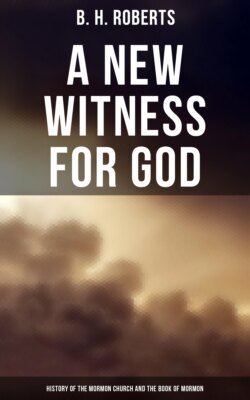Читать книгу A New Witness for God: History of the Mormon Church and the Book of Mormon - B. H. Roberts - Страница 52
На сайте Литреса книга снята с продажи.
Footnotes
Оглавление1. Mill. Star, Vol. xxi, No. 9.
2. See Cooper's American Politics, Bk. I, p. 86.
3. See tables in "American Politics," Bk. vii, pp. 22, 26; also, History U. S. (by Alexander H. Stephens), p. 559.
4. Shortly after the result of the election of 1860 was known in Utah, Elder Orson Hyde, one of the Twelve Apostles, then residing in Sanpete County, Utah, wrote to the Deseret News the following letter:
"Ephraim, Utah Ter., Nov. 27, 1860.
"Will the Judge now acknowledge that Joseph Smith was a true prophet? If he will not, does he recollect a certain conversation had with Mr. Smith at the house of Sheriff Backenstos, in Carthage, Illinois, in the year 1843, in which Mr. Smith said to him: 'You will yet aspire to the Presidency of the United States. But if you ever raise your hand or your voice against the Latter-day Saints, you shall never be President of the United States.'
"Does Judge Douglas recollect that in a public speech delivered by him in the year 1857, at Springfield, Illinois, of comparing the Mormon community, then constituting the inhabitants of Utah Territory, to a 'loathsome ulcer on the body politic,' and of recommending the knife to be applied to cut it out?
"Among other things, the Judge will doubtless recollect that I was present and heard the conversation between him and Joseph Smith at Mr. Backenstos' residence in Carthage, before alluded to.
"Now, Judge, what do you think about Joseph Smith and Mormonism?
"ORSON HYDE."
5. Joseph Smith's "Views of the Powers and Policy of the Government of the United States," Mill. Star, Vol. XXII, p. 743.
6. "Figures of the Past—Joseph Smith at Nauvoo," p. 398.
